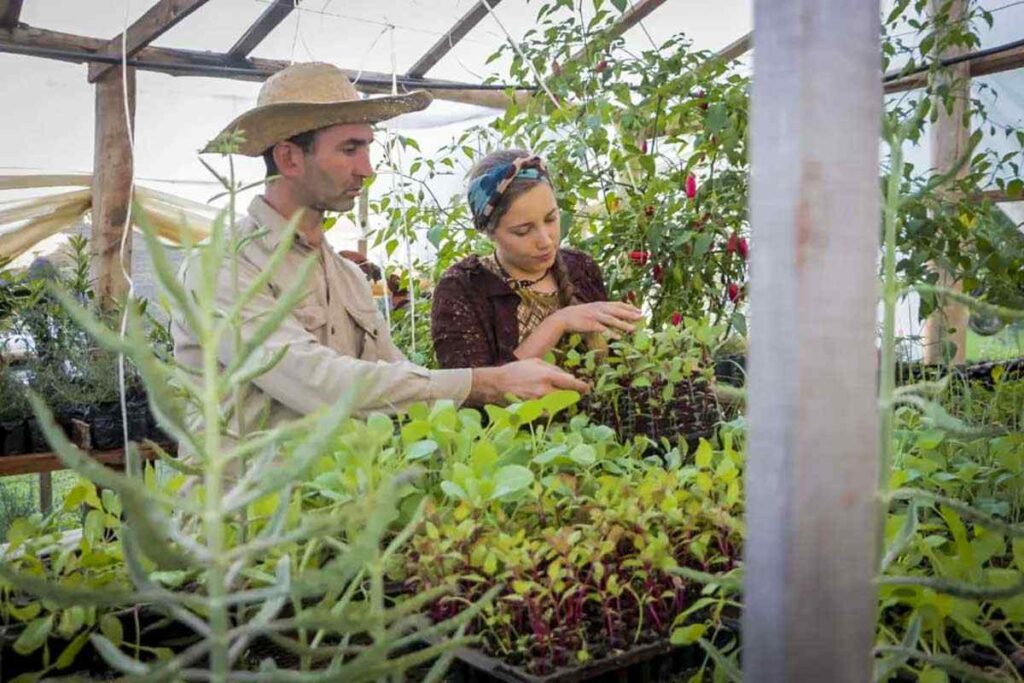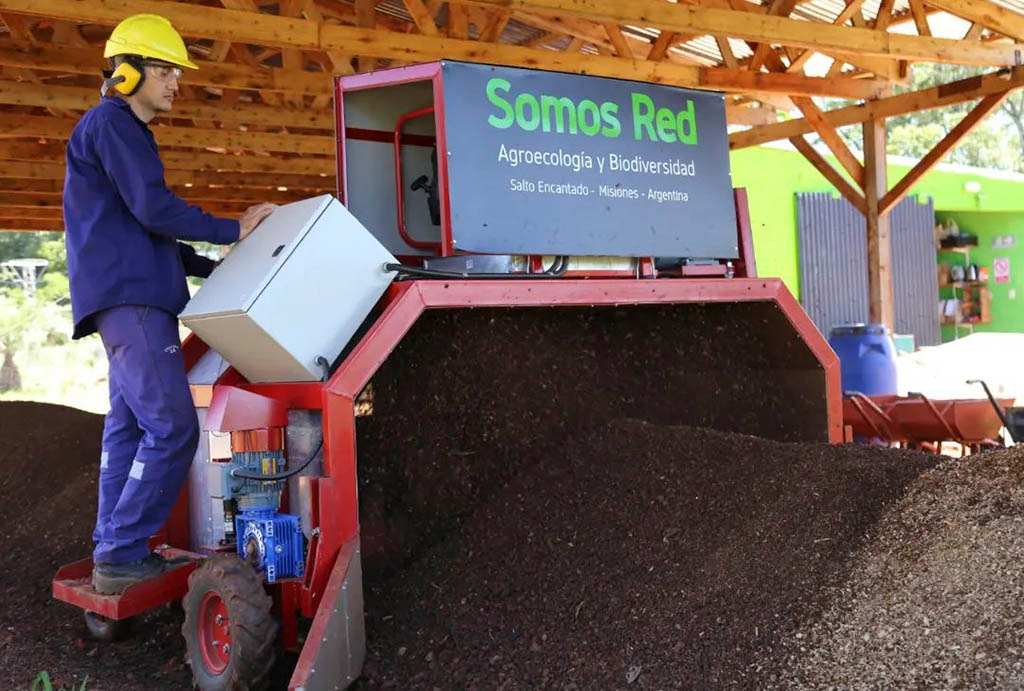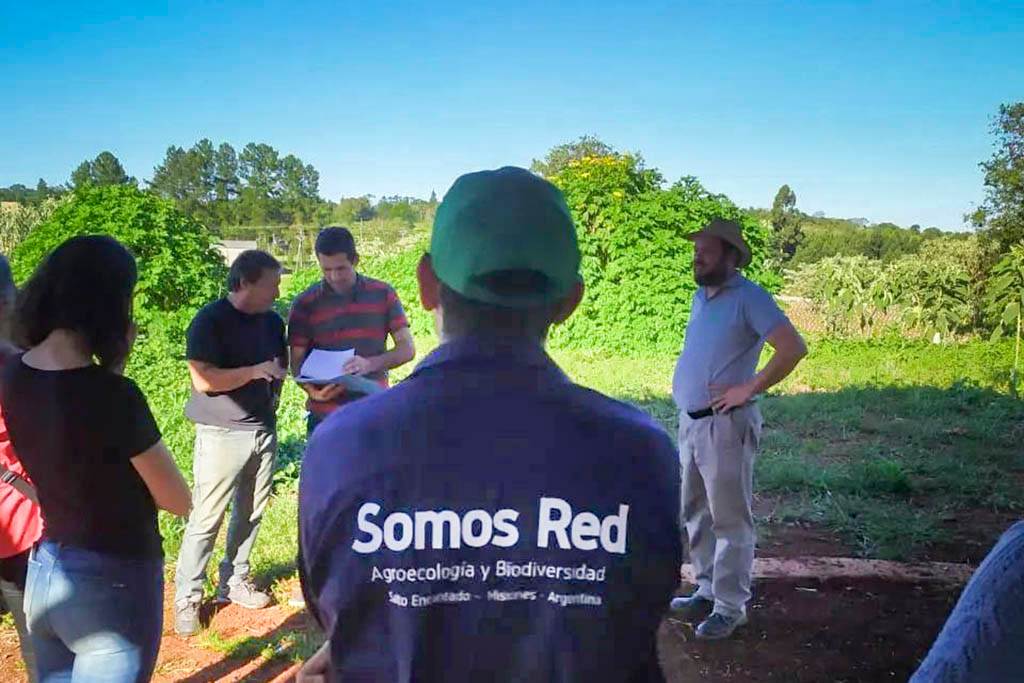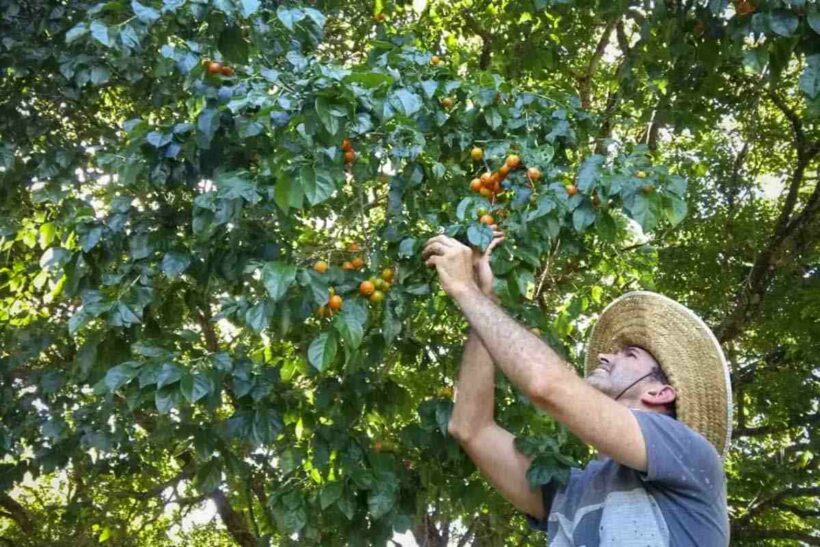Between waterfalls, native forests and agricultural farms, producers from the central area of Misiones joined together in a network with a common characteristic: ecological transition and the desire for youth to remain in rural areas. The union achieved the implementation of a unique biofactory in the country and they are moving forward with other food sovereignty projects.
In July 2020, the Misiones House of Representatives condemned the law that made Salto Encantado the 77th municipality in the province. The town, which is home to the Salto Encantado Provincial Park – one of the biggest tourist attractions in the red land – and which used to belong to the municipality of Aristóbulo del Valle, is characterised both by its natural beauty and by the predominance of agriculture and productive enterprises. Amongst the remnants of native forests, there are yerba mate plantations, family farms, livestock and sawmills, making up the economic and cultural fabric of the region.
Salto Encantado also emerges as an important landmark on the map of agroecology in the province. It does so thanks to an experience that began to take shape shortly before the start of the Covid-19 pandemic and was able to organise scattered projects and form them into a single nucleus: Somos Red (We are Network).
When discussing agroecology in Misiones, one must consider the existence of a Unique System of Participatory Certification, a tool created by the Law for the Promotion of Agroecological Production, which establishes standards and grants an official seal to agroecological production. But beyond this system, multiple agroecological practices and experiences converge in the province, seeking to establish themselves as a sustainable alternative to hegemonic production models.
“We can say that Somos Red is a way of answering monoculture, to pollution, promoting agroecological transition, productive diversification and food sovereignty. From the territory, with community participation, technical innovation and multi-sectoral articulation”, defines Fernando Puzzo, teacher and coordinator of Somos Red.
 Photo: Somos Red
Photo: Somos Red
Reclaiming native forests over monoculture areas
If it has its base and even its origin in Salto Encantado, the territorial deployment of Somos Red expands to other municipalities in the central part of the province. The network is made up of the Asociación Mujeres Soñadoras, Cooperativa Nueva Esperanza, Asociación Ampliando Pueblos, Jóvenes Promotores Ambientales de San Pedro and Salto Encantado, and numerous producer families, researchers and teachers.
Claudia Kozaczek, a producer from Salto Encantado, is one of the founders of Mujeres Soñadoras, which began organising 20 years ago. “In our farms, each of us produced jams from the harvest of native fruits. We decided to get together and see how we could improve, and sell more. We started going house to house, to organise ourselves,” Claudia recalls. Today, there are 50 producers.
“We recovered our grandmothers’ recipes, and we found in cooking a way to support ourselves economically. The jams we make are based on native fruits, such as jaboticaba, guaviroba, caraguatá, ubajay, cerella, pitanga, kinoto, jacaratia, mbocay”, says Claudia.
The production carried out by Mujeres Soñadoras recovers the value of the native forest. Instead of promoting the generation of wealth from the extraction of trees, it is based on harvesting fruit using only 20 per cent of what the tree produces: the other 80 per cent remains as food for the local fauna. “By organising ourselves, we managed to get a piece of land on loan where we make our two lines of jam, handmade and of the highest quality,” says Claudia.
Within Somos Red, the Asociación Civil Mujeres Soñadoras was able to learn about new agroecological perspectives and incorporate practices such as the use of the seeds left over from the jam-making process to generate new plant specimens and thus “enrich degraded areas and try to transfer the native forest to the areas of yerba mate monocultures, roads and pastures”.
 Photo: Somos Red
Photo: Somos Red
Reverdecer Biofactory, fertilizer for agroecological transition
Each organisation and each family integrated in Somos Red preserves its essence and its management models, but at the same time, it finds in the collective space a sure way to deepen agroecological mechanisms and practices, which mark the path of a fairer and more sustainable way of doing things for producers and consumers. “In this area, there are many farms, but very little agroecological production. For this reason, the presence of Somos Red aims to provide farmers with the tools to incorporate agroecology, and to verify the benefits in their own experience,” says Marcos, a member of Jóvenes Promotores Ambientales de Salto Encantado (Young Environmental Promoters of Salto Encantado).
In this quest to bring farming families closer to the agroecological universe, one of Somos Red’s major commitments was the opening of the Reverdecer Biofactory in Salto Encantado, where organic fertiliser is produced for local farmers. “We have the first self-propelled turning machine in the country to produce, monthly, more than 50,000 kilos of bocashi, a type of fermented organic fertiliser, which contributes substantially to the agro-ecological transition that we long for”, says Marianela Scharschinger, a producer who is a member of the network.
“Bocashi is a fertiliser that can be used for all types of crops, always in the right proportions. The network provides training and support to producers so that they can replace the use of agrochemicals with this biosumo. This is fundamental for us. The product we deliver to the producer always includes technical advice”, says Marianela.
Somos Red, circular economy, articulation and rootedness
Puzzo, the coordinator of the network, describes the experience of the biofactory within the concept of “circular economy”, given that the main inputs for the production of compost come from the natural waste that the producers themselves bring in. “Instead of waste ending up having a negative environmental impact, we make it solve problems, in this case, that of compost for production. This is what we call a circular economy,” explains Puzzo, adding that the plant could be expanded, in coordination with the municipality, to process organic household waste and generate a solution that also generates work.
Another key aspect of the Somos Red platform has to do with youth. “Through agroecology, research and making farms sustainable, we also want young people to stay in the countryside. It is a commitment to rootedness. To this end, Somos Red finds in the virtuous articulation with other institutions, both state and private, one of its strengths when it comes to accessing funding projects that benefit producers and extend the agroecological mission of the organisation.
 Photo: Somos Red
Photo: Somos Red
“We try to manage different projects to improve everything from infrastructure to product registers. We also try to buy inputs, materials and other tools that are needed by the entire network of producers. With this funding, apart from improving what we have, we start new projects, new enterprises, some of which are already very strategic in the province,” says the coordinator of Somos Red.
In addition to the aforementioned biofactory, these projects include native species nurseries, a research centre and the breeding of soldier flies (Hermetia inlucens) for the production of flour, to create agro-ecological proteins for animal consumption. There are also sustainable beekeeping projects based on the breeding of native bees, the production of natural cosmetics, agro-ecological herbs and edible mushrooms, among others. “We are convinced that agroecology is the way forward because it means dignity, solidarity, sovereignty, rootedness, the viability of life, and social peace,” says Somos Red.






